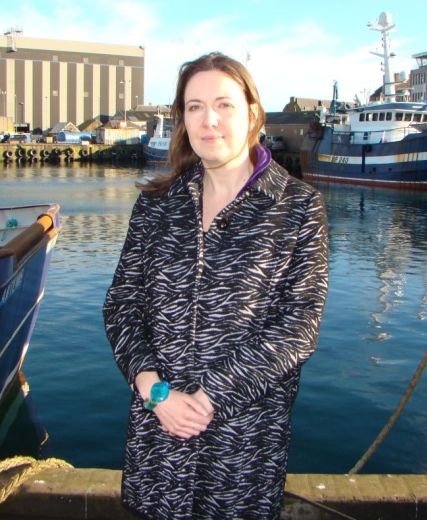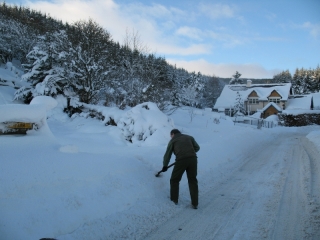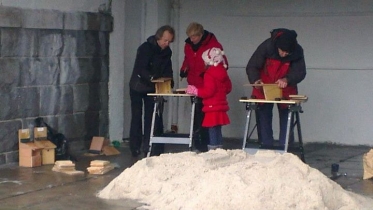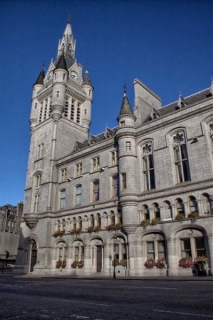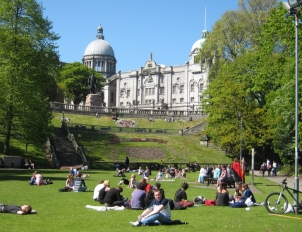Alex Mitchell makes a welcome return to Voice, his insights inspired by his walks around the city and his musing on contemporary affairs.
January 22. Looked out the window this morning and thought, ‘Snaa’s all gone’, then switched on the radio to find that the roads are very hazardous 15-plus miles in all directions out of Aberdeen but especially in the rural hinterland.
One begins to wonder whether it is actually a feasible proposition to live in these inland places.
Winter conditions are obviously much more extreme and also persist much longer – they set in earlier and end later – than on the coast.
Everything is so much more time and trouble, takes so much longer – basic survival becomes the overarching preoccupation, crowding out other interests and concerns.
Even the summers in these inland locations are oppressive – just too hot, no cooling sea breezes, no access to the coast and dead, still air.
This, of course, is why humanity has always tended to cluster around seaports, river estuaries and coastal locations, quite apart from the business and employment opportunities associated with ports, the rivers and the sea – trade, commerce, import/export, fishing, boat and shipbuilding and transportation.
February 10. A Sunday afternoon spent in Union Terrace Gardens, assembling birds’ nesting boxes from kits with a view to building up the resident wildlife.
Cold, rain and sleet, but we were in a sheltered spot under the arches which support Union Terrace itself. Back to the Gardens the following Friday to see the fifteen birds’ nesting boxes, now varnished, being located high up on the trees by skilled personnel with a cherry-picker.
A much milder, Spring-like day, bright and sunny and clumps of snowdrops in evidence.
This is the kind of small-scale incremental improvement, largely undertaken by volunteers, which can transform our civic amenities at modest expense.
February 17. To Holburn Junction and west end of Union Street. Bell’s Hotel is in a very run-down state, the bar still open for business but otherwise closed up, the frontage ill-maintained with much vegetation and a large tree growing out of upper storeys.
Plans for redevelopment, extending the building back to Justice Mill Lane, seem to have stalled.
Further along, in the old Watt & Grant building, one of a clutch of gents’ outfitters, G*Raw, is having a closing-down sale, advertising 70% off. Aberdeen City Council has reluctantly granted planning permission for change of use to a bar/restaurant.
The long-established Austin Reed premises are in poor condition and are advertised for rent, but it is difficult to find tenants for any premises westward of the Music Hall – too far from the main centres of retail activity in St Nicholas Street, Union Bridge and the Union Square mega-mall.
Along Bon Accord Street and Langstane Place to Justice Mill Lane: the Radisson Park Inn hotel looks as tacky and out-of-place as ever, its paintwork and finishes deteriorating already. Similarly, the Travelodge at the other end of the IQ office building. Across Justice Mill Lane, the former Budz Bar premises, closed for refurbishment in 2007 and never reopened, are a major eyesore.
We have become so indoctrinated into regarding property as a wonderful can’t-fail asset and investment that it is difficult to accept that property can, in fact, be effectively worthless or even a net liability, costing more to service and maintain than it can ever earn in rent or other income.
The familiar pattern in the city centre has usually been that ground-floor premises can be let out for use as shops, bars, restaurants and fast-food outlets, but that upper floors are left unlet and unused.
it is difficult, if not impossible, to force landlords to maintain unwanted buildings to an acceptable standard
Upstairs premises used to accommodate professionals such as dentists, tailors, solicitors, architects and accountants, but less so nowadays, perhaps because of the lack of modern facilities, car parking or uncongenial surroundings. The question would obviously arise as to whether it is possible to operate conventional business activity in a street or locality largely given over to pubs and bars.
Much the same would apply to the residential accommodation which used to prevail on the uppermost floors of these old buildings, where the means of exit in the event of fire might be a concern.
The private-sector solution to buildings which are expensive to maintain but which can be neither sold nor let out would be to demolish.
‘Listing’ and Conservation Area status operate to prevent such action, but it is difficult, if not impossible, to force landlords to maintain unwanted buildings to an acceptable standard; many proprietors simply cannot afford to do so, in the absence of any income stream.
Some may resort to deliberate fire-raising to remove a building regarded as a financial liability and money-pit. Derelict and empty buildings are quite likely to be set on fire anyway, by vandals, tramps and rough sleepers.
This is pretty much the position we had reached in relation to MarischalCollege some years ago. The building was impossibly expensive for its owners, the University of Aberdeen, to maintain to any acceptable standard, given that they had little use for it.
There was no serious prospect of sale or of finding a suitable tenant. The private-sector response would have been to demolish, but that was unacceptable to public opinion.
In the meantime, like much of Union Street and the city centre, Marischal College was deteriorating and quite likely to be set on fire and burn down. The only available solution was, in effect, to take the building into public ownership on the basis of a 175-year lease to Aberdeen City Council, since when it has been renovated and put to productive use.
The Council should be able to buy the buildings at modest expense – the landlords want out, after all
This seems to me to be the only workable solution to other such instances of ‘market failure’, where no private-sector solution is forthcoming or acceptable, such as the former Watt & Grant buildings on Union Street and the Victoria Buildings at the foot of Bridge Street, facing down Guild Street.
The Council should be able to buy the buildings at modest expense – the landlords want out, after all – and purchase and renovation costs might form the basis of a future TIF application, given the improving effect on the whole surrounding area which we have already seen happen to spectacular effect with Marischal College and Broad Street.
March 7. The Criterion Bar, Guild Street: a proposal to convert to a Sainsbury’s supermarket.
This used to be an iconic Aberdeen pub, occupying a prominent corner site opposite the railway and bus stations, and was an obvious port of call for many a thirsty traveller or football fan. It had an attractive Edwardian-style interior, featuring much carved wood and etched glass, apparently now largely destroyed.
The pub had been closed these last two years pending another proposal to convert to a Rice & Spice food store.
Whether or not a Sainsbury’s will be of greater utility or amenity than the long-established Criterion Bar remains to be seen. There are two other bars nearby, Aitchie’s Lounge and the Lorne Bar in Trinity Lane, behind the Tivoli Theatre, and of course the Carmelite Hotel.
April 30. Sunny, but cold and windy. Parked the car at the Union Square mega-mall and walked up to M&S via the Green and Correction Wynd, Xmas gift voucher in pocket.
This is one of the first fine, sunny days for weeks, but the Green is completely empty at 2.30 on this weekday afternoon, with nobody going into or coming out of the various premises. Much the same absence of pedestrian footfall evident in Hadden Street.
The longer-term problem with the decline of M&S is that they have always been a mainstay and linchpin of the nation’s High Streets
Through the tunnel under Union Street and up Correction Wynd – an agreeable medieval ambience in the vicinity of the Mither Kirk, but again not a soul – not even a ghostly soul from the Ghaist-raw – to be seen. Along St Nicholas Lane, past the Prince of Wales, to M&S, which is advertising a sale, up to 70% off.
There is a glaring disconnect between M&S’s TV advertising and in-store displays, invariably featuring slender, snake-hipped young people, and the reality of the small numbers of mostly elderly customers trailing wearily around their overheated menswear department looking for a pair of trousers that might conceivably fit the larger person.
I settle for a pair of shoes I don’t really need or want – got to offload the gift voucher somehow.
The problem with having only elderly customers, especially elderly customers who don’t buy much, is that we oldies must sooner or later fall off the perch, and where will M&S, not to mention the Conservative and Unionist Party, or Aberdeen Journals, be left then?
The longer-term problem with the decline of M&S is that they have always been a mainstay and linchpin of the nation’s High Streets – a destination store, in fact – and if there is less and less reason to go back there, then the High Street and our town centres are even deader than we thought.
Walked back to the mega-mall via Correction Wynd and Carmelite Street. The rowan trees planted in enclosures alongside the Aberdeen Market in Hadden Street and in Carmelite Street and Rennie’s Wynd seem to be taking hold and coming on now, but the surrounding shrubs are being overwhelmed by faster-growing weeds.
Container gardening is a very labour-intensive business, as I am sure we all know, and ACC may not have the manpower to do it properly.
May 15. Mary Portas, self-styled Queen of Shops, is back on TV, now trying to work her dubious magic on the nation’s High Streets. She is in the Kentish seaside resort of Margate, being whiny and self-pitying when local traders refuse to let her into their public meeting on the not-unreasonable grounds that she had slandered the town on an earlier visit.
One might as well try to persuade people to take their holidays in Albania
Ms Portas had no real idea what to do about Margate and neither would I, Margate being the equivalent of a Lanarkshire mining town where the coal ran out decades ago.
At one stage Mary P is back in London, trying to persuade the throngs of mostly young people descending on Camden Market to spend their Saturday in Margate instead.
The point unintentionally made here is that people come to Camden because it offers something they want – the antiques and vintage fashion market, the surrounding specialist shops, the pubs, cafés and bars, the whole scene and ambience. People travel from Margate to Camden to experience this.
Nobody travels from Camden to Margate. One might as well try to persuade people to take their holidays in Albania.
The issue is partly one of scale.
A large community can support all kinds of special-interest activities because even just 1% of the population of London, or even of Bristol or Edinburgh, is still a lot of people, with considerable combined spending-power; but 1% of the population of, say, Banchory is only about fifty people, and 1% of the population of a village might be about five people.
Minority or special-interest activities which may well be viable business opportunities in a city or large town are unlikely to be so in a small town or village. A city will normally be able to support a university, possibly two universities, which are large employers in their own right and give rise to many spin-off activities.
Villages, on the other hand, are all too often unable to support as much as a primary school, a pub, a fish and chip shop or an Indian takeaway.
This lack of business opportunities, jobs or choice of employer means that small village communities are of little interest or use to anyone who has to earn a living, and even middle-class retirees tend to shun depressed and run-down places like Margate.
Salesmanship seems to be a fast-shrinking area of employment
Last year I wasted a day in Ecclefechan, Dumfriesshire, which really did seem like the Village Of The Damned, even on a sunny weekday. If a community is to remain viable it simply has to have an economic base of investment, enterprise and employment.
One of the most significant trends of our time is the gradual disappearance of secure and decently-remunerated jobs, such as allow people to lead an independent, adult existence, leave the parental home, get a place of their own and, in due course, finance the purchase of a house in a neighbourhood fit to raise a family in.
One might think of the hierarchy of staff who would be employed in a High Street bank back in the days of Dad’s Army, as compared with the skeleton staff of a modern bank, of which there are in any case far fewer than there used to be. Similarly, insurance offices and travel agents.
Salesmanship seems to be a fast-shrinking area of employment. When do we interact with a salesman/woman nowadays, except perhaps when buying a car?
The internet means that things we used to pay people to do we can now do for ourselves. This reduces the cost of living and makes poverty more bearable, but it also means fewer job opportunities and lower wages in many of such jobs as remain, for example, in journalism.
The recent council elections in England revealed a high degree of discontent in rural communities such as Boston, King’s Lynn and Wisbech to the effect that there are simply no decent jobs, or jobs that pay a living wage. The jobs there used to be on the land, in farming, have largely been mechanised out of existence.
The point was made that locally, the average wage has converged on the National Minimum Wage of about £6-7 per hour, whilst quite a few employers in practice contrive to pay even less than the Minimum Wage.
I was a bit concerned, since it is not normally a good sign when whales and dolphins come up-river
Employee benefits such as pensions have been cut back and working conditions are deteriorating. People are caught by the twin pincers of falling wages and rising house prices. The average wage no longer finances the purchase of the average house, or indeed any house.
Such council housing as existed was sold off in the 1980s and the tied cottages occupied by farm workers are long gone.
Local discontent tends to target East European immigrants, but their impact is mixed.
They compete for certain kinds of work and housing, possibly driving wages down and rents up, but some industries – fruit-picking, fruit and veg processing and hotels – would not survive without immigrant labour, and their children sustain enrolment in local schools, many of which would otherwise close.
Immigration from Eastern Europe is probably one of the few dynamising elements of the Fenland economy, if the truth be told, and the same may also be true of much of Scotland.
June 4. The BBC’s Springwatch has highlighted the activities of the dolphins which congregate around the entrance to Aberdeen harbour. The first time I saw these creatures I was a bit concerned, since it is not normally a good sign when whales and dolphins come up-river, usually suggesting that they are lost and confused.
Dolphins and whales would normally avoid a noisy, heavily-trafficked locale such as the harbour entrance. The attraction for the Aberdeen dolphin pod is the confluence of fresh water coming down the River Dee and the salt water of the North Sea.
Salmon, returning up-river to breed, can only access the river of their birth via the narrow harbour entrance, and are thus easy pickings for the waiting dolphins. The Aberdeen dolphins were described as ‘large, fat, talkative, loud and they repeat themselves’.
They have evolved as larger animals to cope with the cold North Sea, acquiring an extra layer of blubber in the process. They chatter a lot between themselves, loudly and repetitively, so as to be able to work as a team to trap the incoming salmon.
In effect, the dolphins are having to shout to make themselves heard against the background of submarine noise generated by ships moving in and out of the harbour. They have become a significant visitor attraction viewed from the Nigg car park and elsewhere.
- Comments enabled – see comments box below. Note, all comments will be moderated.
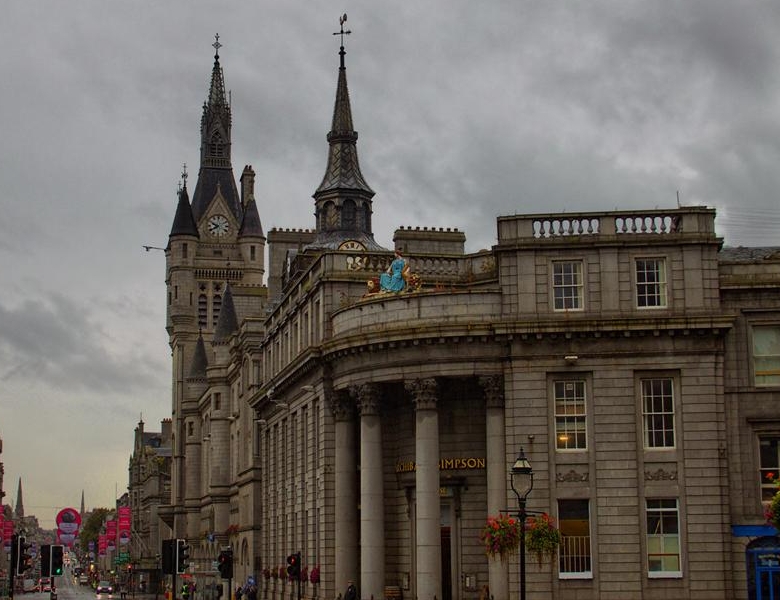 All over the world, people are falling prey to the terrible malaise of depression, and losing their lives to suicidal impulses. Statistically, Scotland is the worst affected part of the UK, with more depressed people and suicide attempts per capita than anywhere else in Britain.
All over the world, people are falling prey to the terrible malaise of depression, and losing their lives to suicidal impulses. Statistically, Scotland is the worst affected part of the UK, with more depressed people and suicide attempts per capita than anywhere else in Britain.